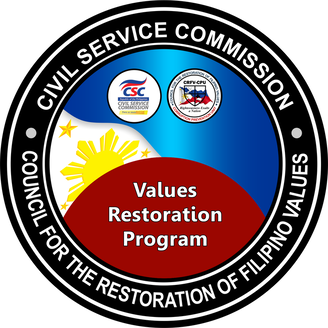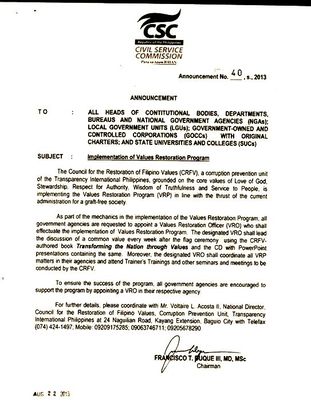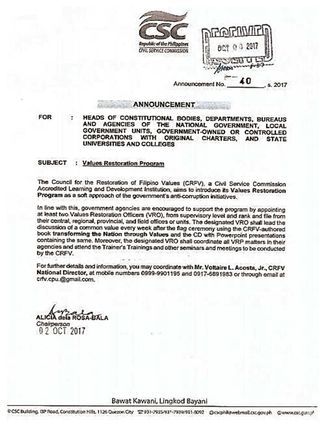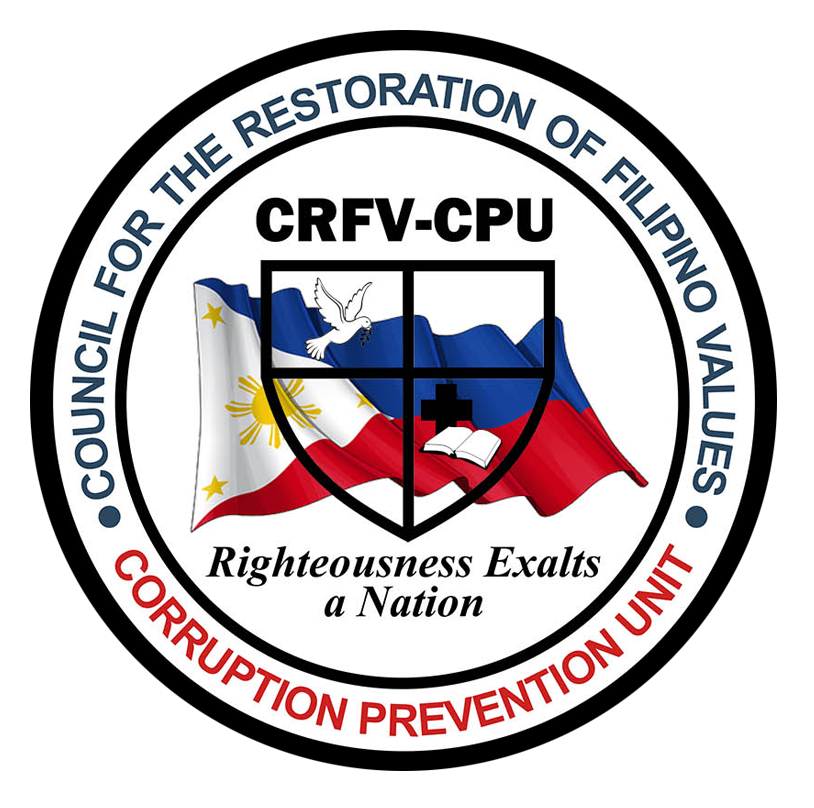In 2013, in accordance with the thrust of the government for a graft-free society, a public-private partnership between the Civil Service Commission (CSC) and the CRFV was established for the implementation of the Values Restoration Program (VRP) through CSC Announcement No. 40, s. 2013 signed by the then CSC Chairperson Francisco T. Duque III. The Civil Service Announcement encouraged the implementation of the VRP in all Constitutional Bodies; Department, Bureaus and National Government Agencies (NGAs); Local Government Units (LGUs); Government-Owned and Controlled Corporations (GOCCs) with original charters; and State Universities and Colleges (SUCs).
The public-private partnership continued as the current CSC Chairperson Alicia dela Rosa-Bala reinforced the implementation of VRP through CSC Announcement No. 40, s. 2017, citing the Values Restoration Program as a soft approach of the government's anti-corruption initiatives. It hopes to transform the nation through values, as men and women in public service commit to live value-laden and exemplary lives until righteousness, transparency and accountability be the hallmark of public service.
The public-private partnership continued as the current CSC Chairperson Alicia dela Rosa-Bala reinforced the implementation of VRP through CSC Announcement No. 40, s. 2017, citing the Values Restoration Program as a soft approach of the government's anti-corruption initiatives. It hopes to transform the nation through values, as men and women in public service commit to live value-laden and exemplary lives until righteousness, transparency and accountability be the hallmark of public service.
RATIONALE
To efficiently implement the Values Restoration Program in cognizance to CSC Announcement No. 40 series 2013 & 2017, a VRO must be competently equipped with the skills how to train and empowered with the core values what to teach. Thus, this program is designed to address both concerns by intertwining skills training and values enhancement colloquium.
OBJECTIVES
At the end of the program, the participant is able to:
COURSE CONTENT
.
DUTIES AND RESPONSIBILITIES OF A VALUES RESTORATION OFFICER FROM A GOVERNMENT AGENCY:
QUALIFICATIONS OF THE VALUES RESTORATION OFFICER FROM A GOVERNMENT AGENCY:
To efficiently implement the Values Restoration Program in cognizance to CSC Announcement No. 40 series 2013 & 2017, a VRO must be competently equipped with the skills how to train and empowered with the core values what to teach. Thus, this program is designed to address both concerns by intertwining skills training and values enhancement colloquium.
OBJECTIVES
At the end of the program, the participant is able to:
- Identify the goals and importance in implementing the Values Restoration Program for their respective offices/ agencies;
- Identify the Pili-pino values needed to be enhanced to effectively implement the Values Restoration Program as stipulated in CSC Announcement No. 40, series of 2013;
- Acquire the necessary training skills to competently conduct VRP in their respective offices/ agencies.
COURSE CONTENT
.
- An overview of the goals and relevance of Values Restoration Program according to CSC Announcement 40.s 2017
- Concept briefing of the following (Trainers’ Training Course)
- Principles of Trainer Excellence
- Characteristics of Adult learners, their motivations, learning styles and their learning environments
- Different Roles of a trainer and trainee, and how to manage the latter.
- The Trainer and his/her Professional Presence
- Core Values Identification:
- Love of God
- Respect for Authority
- Integrity with emphasis on Stewardship, Truthfulness and Sanctity of Marriage (from PAVES Module 2)
- Accountability (from PAVES Module 3)
- Power of Influence
- Selfless love and service to people in connection with R.A. 6713 or the Code of Conduct and Ethical Standards for government officials and employees
DUTIES AND RESPONSIBILITIES OF A VALUES RESTORATION OFFICER FROM A GOVERNMENT AGENCY:
- Closely collaborate with the Values Restoration Officer (VRO) from the Private Sector for the teaching of the weekly Value Focus during the flag ceremony and 20 minute classroom discussion among the employees of the department or agency;
- Effectively arrange the schedule for the classroom discussion so as not to impede the rendition of effective public service;
- In the absence of the VRO from the Private Sector, he/she will perform the necessary duties of his or her counterpart VRO from the private sector particularly the teaching of the weekly value focus during the flag ceremony and during the classroom type discussion.
QUALIFICATIONS OF THE VALUES RESTORATION OFFICER FROM A GOVERNMENT AGENCY:
- He/she must be of good moral character and active advocate of good governance by modelling it before the other government personnel;
- He/she is of good conduct based on the evaluation of his/her Head of Office and based on the judgment and general observation of his/her co-employees in the agency;
- He/she should have been one of the best performing employees in the government agency and have not been held guilty or liable of nonfeasance, misfeasance, or malfeasance in office or of any flagrant violation of laws and reasonable rules and regulations of the agency.
What is VRP?
VRP stands for Values Restoration Program. This is a public-private program sanctioned by the Civil Service Commission and released through CSC Announcement No. 40 s. 2017. By definition, VRP refers to the initiatives undertaken by the Council for the Restoration of Filipino Values (CRFV) with the aim of establishing a graft-free and value-laden society.
What are the goals of VRP?
There are three goals which define all other objectives aimed by VRP:
- To empower government employees by raising Organic VROs who will effectuate the implementation of Values Restoration Program;
- To strengthen the public-private partnership advocacy of the state by engaging Counterpart Private Sector Representative (PSR) VROs in the drive against corruption and inefficiency in the government; and
- To emphasize the necessity of consistent education in values restoration by conducting regular trainings and seminars that will raise public awareness on the evils of corruption and the means of fighting the same.
WHAT IS THE DIFFERENCE BETWEEN VRP AND MRP?
In essence, VRP advocates all principles espoused by MRP (Moral Recovery Program), released through Executive Order 319: Institutionalizing the Moral Recovery Program (MRP) in all government departments, offices, agencies, and government-owned and controlled corporations through the establishment of Integrity Circles. While MRP is state-initiated, VRP is CSO-initiated, state-sanctioned. VRP simply leverages on existing government policy on MRP as a means to strengthen the moral resources of the Filipino people rooted in Filipino culture, values, and ideals that are pro-God, pro-People, pro-Country, and pro-Nature.
WHO ARE ENJOINED TO SUPPORT VRP?
CSC Announcement No. 40 s. 2017 is addressed to all heads of constitutional bodies, departments, bureaus, and national government agencies (NGAs); local government units (LGUs); government-owned and controlled corporations (GOCCs) with original charters; and state universities and colleges (SUCs).
WHAT ARE THE PROGRAM COMPONENTS OF VRP?
VRP has Six program components, namely:
- VRO Training the Trainers (Appointment) Training;
- Public Accountability and Values Enhancement Seminar (PAVES);
- Paralegal Training;
- Public Service and Values Program (PSVP);
- Nation Builders Summit (NBS);
- Customized Trainings.
WHAT IS A VRO?
VRO (Values Restoration Officer) refers to an action officer from CRFV, to organic employees from different government agencies who were trained and appointed by CRFV who shall undertake the implementation of the VRP.
HOW DO GOVERNMENT AGENCIES IMPLEMENT VRP?
CRFV will first coordinate with the agency concerned to provide orientation and briefing on VRP. Then, the agency concerned shall organize the conduct of PAVES, which is the basic requirement before the appointment of prospective VROs. From among the participants of PAVES, the head of the agency shall designate/appoint an organic employee, preferably from the Human Resource Department, Guidance Office, or Values Education Department, as the case may be, to act as the agency’s Values Restoration Officer.
Next, CRFV will coordinate with the appointed VRO for the full-swing implementation of VRP in the agency, which will begin with the conduct of the WVF.
Next, CRFV will coordinate with the appointed VRO for the full-swing implementation of VRP in the agency, which will begin with the conduct of the WVF.
ARE THE VRO S REQUIRED TO PRODUCE THEIR OWN MATERIAL TO DISCUSS DURING THE WVF?
No. CRFV shall provide respective VROs the materials needed for the implementation of VRP, specifically WVF. In particular, CRFV has produced Transforming the Nation through Values, a book containing fifty-two (52) value focuses that will cover the number of weeks in the entire year.
HOW LONG SHALL VRP BE IN EFFECT FOR?
VRP shall remain as an official CSC-sanctioned government policy unless expressly and intently recalled and reversed by CSC. To measure effectiveness, however, CRFV has set a 7-year program of implementation. This will ensure that the values advocated by VRP are thoroughly ingrained in the hearts and minds of its recipients.
IS VRP LIMITED TO THE CONDUCT OF DISCUSSIONS, TRAININGS, AND SYMPOSIA ALONE?
No. VRP is encompassing. Considering the substance of values, morals, and ethics inculcated by VRP, it is expected that other programs and projects shall spring out of the implementation of VRP, especially in areas with diverse and imminent needs, and in which there is a necessity to customize the program. This may include organic farming, entrepreneurship, personality development, skills-based training, and other customized programs.
ARE OTHER CSO S ALLOWED TO UNDERTAKE VRP?
Technically, no. VRP is sanctioned solely for CRFV, although this does not inhibit other CSOs from developing and implementing their own values/moral programs. Those who intend to implement VRP in their respective localities must first engage in a Memorandum of Agreement with CRFV. VRP as a concept is exclusively owned by CRFV.
IS THERE A COMPENSATION FOR BEING A VRO?
None. However, a volunteer VRO shall have access to the pool of national-level trainings and seminars provided by CRFV. They may use it as part of their curriculum vitae. Moreover, a VRO shall be empowered to act as government watch for Anti-Red Tape Act (ARTA), procurement, environmental protection, fair labor, and other civil and administrative issues and concerns.
WHAT ARE THE BENEFITS OF SUPPORTING VRP?
By supporting VRP, you become an advocate for values restoration and moral recovery among government ranks. At present, several anti-corruption organizations such as Transparency International estimate cost of corruption in the Philippines at twenty per cent of the annual gross national budget, which is a conservative figure. If every single government employee will have consistent knowledge and understanding of the effects of corruption, then we can move on forward as a country devoid of crooked and self-serving politicians and government officials. Imagine what this means to your children and the next generations to come.
DOES A VRO HAVE THE POLICE POWER TO APPREHEND ERRING GOVERNMENT OFFICIALS AND/OR EMPLOYEES?
None. However, representing CRFV which is a partner CSO of CSC, VROs are advised to be both confident and prudent in handling graft and corruption-related cases which they may face in the course of delivering their service
CAN WE USE OUR VRO APPOINTMENT TO OBTAIN SPECIAL PRIVILEGES WHILE AVAILING SERVICES FROM THE GOVERNMENT (E.G. OBTAINING CLEARANCE, EVADING TRAFFIC VIOLATION TICKETS)?
Definitely not. As the proponent of integrity and righteousness through VRP, VROs and partner CSOs are discouraged from cutting corners, violating the law, or getting around with it. VROs are deemed truthful to their vow as advocates of righteousness, justice, and peace.
WHAT SUPPORT ARE WE EXPECTING FROM CRFV IN THE SUCCESSFUL IMPLEMENTATION OF THE VRP?
The CRFV team is always available to attend to your queries and concerns. We have annual capacity building for all VROs; we also publish supplementary articles that you may use during WVF discussions.
VRO Training Batch 2 (organic) 24-27 March 2015 |
VRO Training Batch 1 (organic) February 2015 |
VRP Vision Casting to Baguio-Benguet PSRs 2014 |




